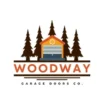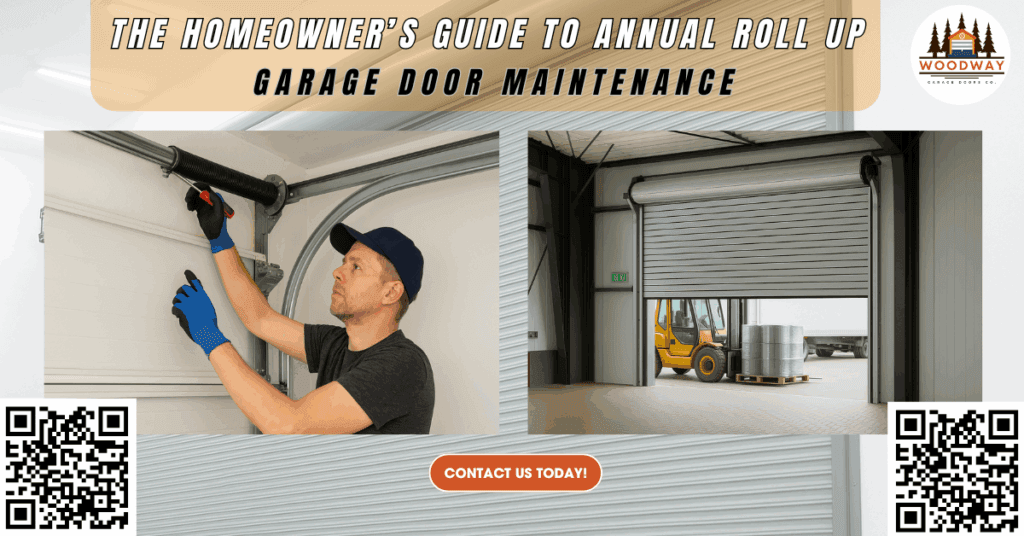Last December, a homeowner in Memorial called our team at Woodway Garage Doors Co. in a panic. Their insulated garage door refused to open during a sudden cold snap, trapping their car inside. Our inspection revealed that worn-out rollers and poor garage door insulation maintenance had allowed cold moisture to freeze the components. It could have been prevented with a simple annual checkup.
Your garage door is more than a way in and out of your home; it’s a vital system made of insulation materials, springs, rollers, and electronics. And if you have an insulated door, your energy savings and garage space temperature also rely on that door working properly. Most garage doors open and close over 1,500 times per year, and without maintenance, that adds up to wear, thermal transfer, and eventually, failure.
If you live in Houston or nearby areas like Bellaire, River Oaks, or The Heights, this step-by-step guide will help you understand how to keep your roll-up garage door, whether steel, aluminum, or fiberglass, running efficiently year after year. Let’s help you avoid unnecessary energy bills, breakdowns, or insulation problems by following a smart annual routine.
Understanding Your Roll-Up Garage Door System
A roll-up garage door is designed to coil into a roll above the garage opening, saving horizontal space and maximizing vertical storage. These are common in both residential and commercial garages, made from materials like steel, aluminum, or fiberglass.
They may include:
- Insulated panels made of polyurethane or polystyrene
- A garage door opener system with a logic board
- Weather seals to prevent heat transfer and temperature loss
- Springs and rollers to manage movement
Choosing the right insulation material, like rigid foam, urethane, or styrofoam, and maintaining it properly affects energy efficiency, noise reduction, and even your home’s return on investment.
Why Annual Maintenance Is Crucial
Skipping annual maintenance leads to:
- Energy loss through broken seals or worn insulation
- Noise from dry rollers or loose components
Weather damage from Houston’s heat, humidity, or sudden cold spells - Costly repairs or reduced lifespan of the door
A well-maintained insulated garage door improves your home’s energy efficiency, reduces garage temperature swings, and protects valuables, especially during summer heat or winter chills.
Step-by-Step Guide to Annual Roll-Up Garage Door Maintenance
1. Surface & Panel Inspection
Look for damage on the garage door panels, including dents, rust, cracks, or warped insulation. Clean panels with mild soap and water. Damaged steel doors or aluminum doors should be repaired or replaced to prevent air leakage.
2. Test the Balance
Disconnect the opener and manually raise the door halfway. If it stays in place, it’s balanced. If it drops, call a pro bad balance strains the garage door opener, logic board, and insulated panel system.
3. Inspect & Lubricate Moving Parts
Apply garage door lubricant (not WD-40) to:
- Rollers
- Hinges
- Tracks
- Springs
This prevents noise, improves movement, and reduces wear on both insulated and non-insulated doors.
4. Clean the Tracks
Remove debris from the tracks and check for misalignment. Bent tracks cause the door to jam, which can damage sectional doors or foam-insulated garage doors.
5. Check Weatherstripping & Seals
Inspect the bottom seal and side weatherstripping. These prevent thermal transfer, dust, moisture, and pests. Replace hardened or cracked seals to maintain energy-efficient conditions inside your garage space.
6. Evaluate the Insulation
Check your door’s insulation type. Over time, foam panels, batt insulation, or even urethane sheets can sag, crack, or absorb moisture. Consider upgrading to high R-value or low U-value materials for better heat insulation.
7. Test the Auto-Reverse System
Place a small block under the door and close it. It should reverse when it touches the object. This protects your family and pets, and if it fails, your garage door opener likely needs servicing.
8. Examine the Opener System
Look over the logic board, light socket, and power cord. Does the remote respond slowly? Is the opener unusually loud? These can indicate a faulty Chamberlain garage door opener or worn Craftsman garage door parts.
9. Listen Carefully
Grinding, squeaking, and banging noises mean something’s off. Noise reduction is key not only for comfort but also for spotting early mechanical failures.
Insulated vs. Non-Insulated Garage Doors
Let’s break down the pros and cons:
| Feature | Insulated Doors | Non-Insulated Doors |
| Energy Efficiency | High | Low |
| Noise Reduction | Excellent | Minimal |
| Temperature Control | Strong barrier | None |
| Cost | Higher initial cost | Lower upfront |
| Return on Investment | Excellent for homes | Less value over time |
If you use your garage for a gym, workshop, or have bedrooms above, investing in insulated garage doors or garage door insulation kits is a smart choice.
DIY Maintenance vs. Professional Help
You can handle basic cleaning, lubrication, and visual inspections. But tasks like:
- Spring tensioning
- Track realignment
- Logic board diagnostics
- Upgrading insulation kits
…should be done by trained professionals. Incorrect handling can lead to injury or damage. At Woodway Garage Doors Co., our technicians are trained to safely service all garage door types, from Martin garage doors to Amarr garage doors and everything in between.
Common Garage Door Insulation Materials
| Material | R-Value | Cost | Pros | Cons |
| Polystyrene | Moderate | Affordable | Lightweight | Less impact resistant |
| Polyurethane | High | Premium | Best insulation | Costly |
| Fiberglass | Medium | Moderate | Fire-resistant | May sag over time |
| Rigid Foam | High | Moderate | Easy to install | Needs protection |
These materials improve temperature regulation, reduce heat transfer, and help maintain comfort during Houston’s summer heat or winter lows.
How Can Woodway Garage Doors Co. Help You?
At Woodway Garage Doors Co., we specialize in expert roll-up garage door maintenance, repairs, and insulation upgrades for homeowners across Houston, TX, and surrounding neighborhoods like Tanglewood, West University, Galleria, and Spring Branch.
✅ Annual tune-ups for insulated and non-insulated garage doors
✅ Repairs for openers, panels, springs, and insulation materials
✅ New installations with energy-efficient, high R-value options
✅ Trusted brands including Clopay, Martin, Amarr, and more
✅ Local, responsive service that puts your family’s safety first
📍 Visit Us: 4900 Woodway Dr Ste 1110, Houston, TX 77056
📞 Call Today: (214) 296-9993
Your garage door protects your home, vehicles, and peace of mind. Let us help you maintain it the right way. Call now to schedule your annual garage door maintenance, or ask about upgrading to an insulated garage door that saves you money and boosts your home’s value.
Frequently Asked Questions (FAQs)
1. How long do roll-up garage doors typically last?
With proper maintenance, roll-up garage doors can last 20 to 30 years, depending on the material, usage frequency, and climate conditions.
2. Can I upgrade an existing roll-up door with insulation?
Yes, you can add insulation kits such as foam panels or reflective barriers to many existing roll-up doors without replacing the entire unit.
3. What R-value should I look for in an insulated garage door?
For Texas climates, an R-value between R-9 and R-18 is typically recommended for energy efficiency and indoor temperature control.
4. Are roll-up garage doors safe during hurricanes or extreme storms?
High-wind rated or reinforced roll-up garage doors are available and recommended in storm-prone areas for added safety and durability.

